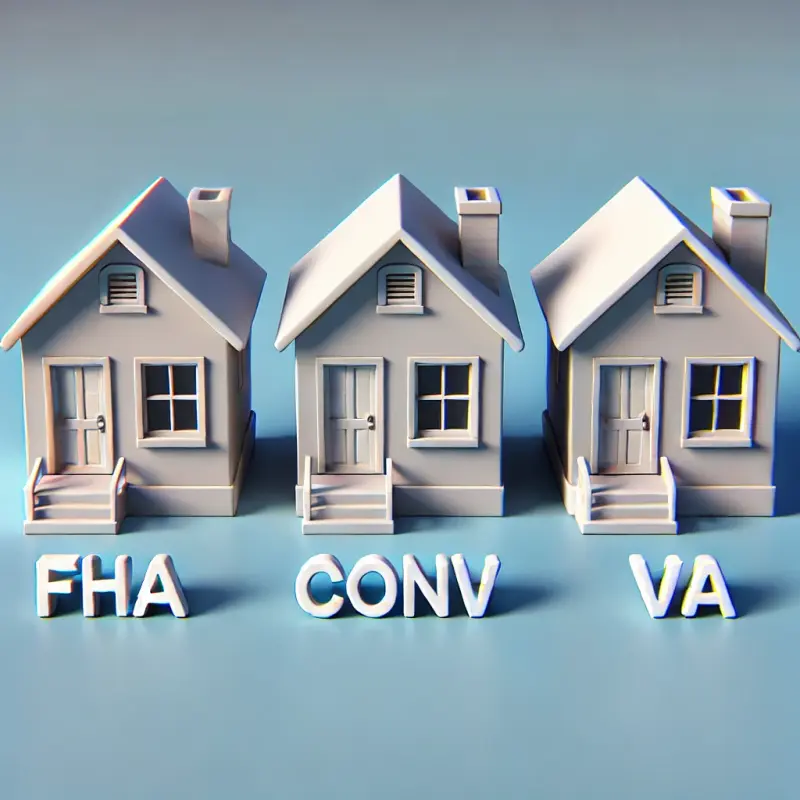Understanding Different Types of Mortgages: FHA vs. Conventional vs. VA Loans

When it comes to purchasing a home, choosing the right type of mortgage is one of the most crucial decisions you'll make. The mortgage landscape offers various options, each tailored to different financial situations and goals. Three of the most popular mortgage types are FHA loans, Conventional loans, and VA loans. Understanding the differences between these options can help you make an informed decision that best suits your needs.
FHA Loans: Ideal for First-Time Homebuyers
The Federal Housing Administration (FHA) loan is a popular choice for first-time homebuyers and those with less-than-perfect credit. Here’s what you need to know:
- Low Down Payment: FHA loans require as little as 3.5% down, making homeownership more accessible.
- Credit Flexibility: Borrowers with credit scores as low as 580 can qualify, though a higher score may be required by some lenders.
- Mortgage Insurance: FHA loans require both an upfront mortgage insurance premium (MIP) and an annual premium, which increases the overall cost of the loan.
- Loan Limits: There are limits on how much you can borrow, which vary depending on the region.
When to Consider an FHA Loan: If you have a lower credit score, limited savings for a down payment, or if you’re a first-time homebuyer, an FHA loan could be a good fit.
Conventional Loans: Flexibility and Competitive Rates
Conventional loans are not backed by the government and typically offer more flexibility for borrowers with strong financial profiles.
- Down Payment: Down payments can be as low as 3%, though putting down 20% or more can help you avoid private mortgage insurance (PMI).
- Credit Requirements: Conventional loans generally require higher credit scores (typically 620 or above) and a stable financial history.
- Loan Limits: Conventional loans also have limits, but these are generally higher than FHA loan limits.
- Interest Rates: Depending on your credit score and down payment, conventional loans often offer competitive interest rates.
When to Consider a Conventional Loan: If you have a solid credit history, enough savings for a down payment, and want to avoid the additional costs of mortgage insurance, a conventional loan might be the best option.
VA Loans: A Benefit for Veterans and Service Members
VA loans are backed by the U.S. Department of Veterans Affairs and are designed to offer military service members, veterans, and eligible surviving spouses some of the best mortgage terms available.
- No Down Payment: VA loans often require no down payment, making homeownership accessible without needing to save for years.
- No Mortgage Insurance: Unlike FHA and conventional loans, VA loans don’t require mortgage insurance, which can significantly reduce your monthly payments.
- Credit Requirements: While the VA doesn’t set a minimum credit score, most lenders require a score of at least 620.
- Additional Benefits: VA loans offer competitive interest rates, limited closing costs, and no prepayment penalties.
When to Consider a VA Loan: If you’re a veteran, active-duty service member, or eligible surviving spouse, a VA loan is an excellent option due to its favorable terms and lack of a down payment requirement.
Which Mortgage is Right for You?
Choosing the right mortgage depends on your financial situation, future plans, and eligibility. Here’s a quick comparison:
- FHA Loan: Best for first-time homebuyers, those with lower credit scores, or limited down payment funds.
- Conventional Loan: Ideal for borrowers with strong credit and the ability to put down a significant down payment.
- VA Loan: The best choice for eligible veterans and service members due to its no down payment requirement and favorable loan terms.
Before making a decision, consider speaking with a mortgage professional who can help you evaluate your options based on your specific needs. By understanding the differences between FHA, Conventional, and VA loans, you’ll be better equipped to choose the mortgage that aligns with your financial goals.
